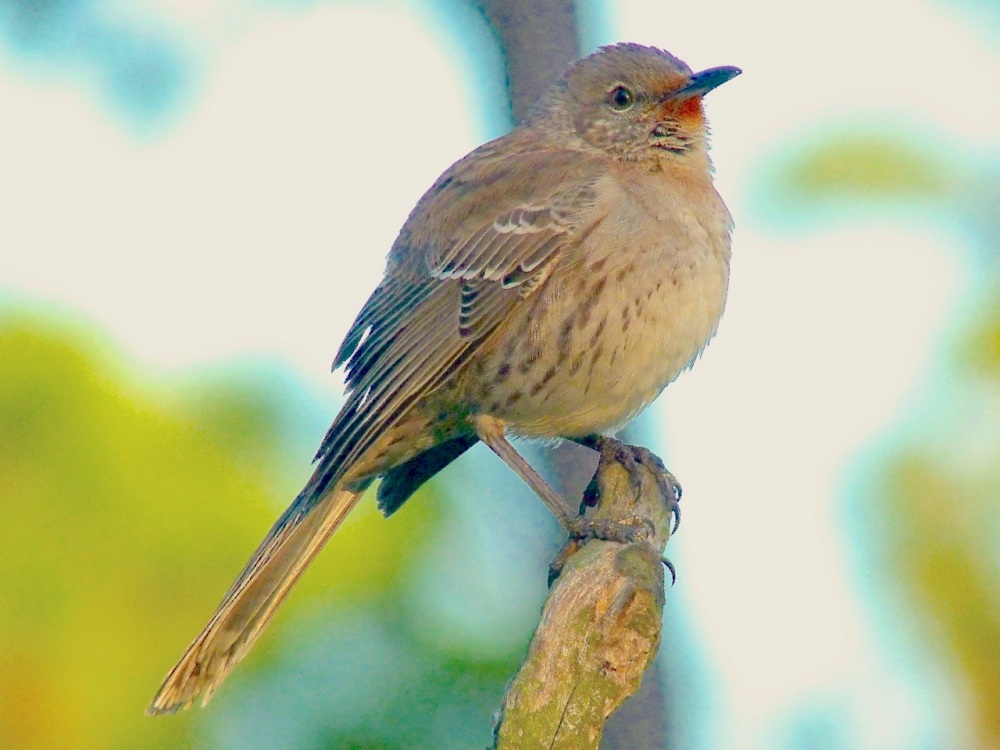BAHAMA MOCKINGBIRDS ON ABACO: GOOD IMPRESSIONS
The Bahama Mockingbird Mimus gundlachii is similar to its slightly smaller cousin, the widespread Northern Mockingbird Mimus polyglottis. The range of Bahama Mockingbirds is not restricted to the Bahamas themselves, and includes areas of Cuba, Jamaica and TCI, so despite the name they are not an endemic species to the Bahamas. They are also occasional vagrants to the United States, especially – for reasons of proximity – southeastern Florida.
The Bahama Mockingbird is browner than the greyish Northern Mockingbird, and has distinctive streaking and spotting to its breast and undercarriage. This may extend to what you might describe as the bird’s ‘trouser legs’, though I’m sure there’s a more technically correct term.
Both mockingbird species are found on Abaco. The NMs are ubiquitous in towns, settlements, gardens, coppice and pine forest, whereas BMs are shyer and tend to be found in the pine forest and well away from humans and their operations. When we were putting together The Birds of Abaco, I went on a birding trip with Abaco birding legend Woody Bracey and Ohio bird photographer Tom Sheley. We took a truck into the pine forest down a logging track south of Delphi, and they were quick to locate a bird, not least because one was sitting prettily on a branch singing lustily and unmistakably. It was well within range of Tom’s massive lens; more of a struggle for my modest camera (below). Caught the cobwebs, though…
I was astounded by the beauty and variety of the song. It consisted of very varied notes and phrases, each repeated 3 or 4 times before moving on to the next sounds in the repertoire. Here is a short 18 second example I recorded, using my unpatented iPhone method, for which see HERE.
For those with interest in birdsong, here is a longer 1:13 minute song from the same bird, with largely different sounds from the first recording made minutes earlier. There’s even a decent stab at imitation of a 1960s Trimphone™. Had we not had to move on to Sandy Point for an appointment with some cattle egrets and American kestrels, I could have stayed listening for far longer.
THE ‘SUBSPECIES’ THAT WASN’T…
More recently, on a trip in backcountry to find Kirtland’s warblers – we saw 4 – the slow-moving truck jolted to halt in the middle of nowhere. This was because a Bahama Mockingbird was right by the track. I fired off some quick shots out of the window into a rather difficult light, to find that we appeared to have found a new subspecies, the scarlet-faced mockingbird.
The reason was clear, however. The bird had been pigging out on some red berries, and had managed to collect plenty of the juice round the base of its beak. 
SO WHAT DOES A NORTHERN MOCKINGBIRD LOOK LIKE, THEN?
I photographed the Northern Mockingbird below in a garden at Casuarina. The species is far tamer than its cousin, and seen side-by-side they are clearly very different. The range maps show the stark contrast between the very limited range of the Bahama Mockingbird and the vast distribution of the Northern Mockingbird.

Photos Credits: Tom Sheley (1, 6); Peter Mantle (2); Charlie Skinner (3); Keith Salvesen (4, 7, 8, 9); Alex Hughes (5); Susan Daughtrey (10). Range maps eBird & wiki.










Pingback: “San Andrés Mockingbird” – birdfinding.info
Pingback: Northern Mockingbird – birdfinding.info
Pingback: Bahama Mockingbird – birdfinding.info
It could be confusing to someone trying to learn ID points for the two mockingbird species when a spotted juvenile Northern Mocking bird image appears to be illustrating text describing Bahama Mockingbird. https://rollingharbour.files.wordpress.com/2017/04/bahama-mockingbird-csk-dsc_9352-copy-2.jpg
LikeLike
Quite right to draw my attention to this image, Tim. Looking at it again, I agree it’s a juvenile NoMo that was file-named as a BaMo by the photographer and foldered as such by me. Oddly, others far more experienced than I have seen the image and not flagged it as wrong. I’ll either remove it, or more likely work it into the post as an example of a possible confusion – with a tip of the hat to you. Thanks. RH
LikeLike
Wonderful captures!
LikeLike
Thanks Cindy – glad you like the local mockers!
LikeLike
Pingback: Cuban mockingbirds, Zapata sparrow and frigatebirds | Dear Kitty. Some blog